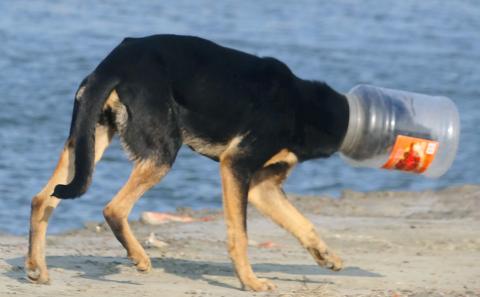Taiwan ranked 29th out of 132 nations in this year’s Environmental Performance Index (EPI), a report by the Yale Center for Environmental Law and Policy and Columbia University’s Center for International Earth Science Information Network, the Environmental Protection Administration said.
Taiwan had ranked 24th among 133 nations in the 2006 EPI and 40th out of 149 nations in the 2008 EPI, the agency said, and this year’s ranking of No. 29 surpassed the performance of nations such as Canada (37), South Korea (43), Australia (48), the US (49), Singapore (52) and China (116).
According to the report, Switzerland ranked No. 1 in overall performance, followed by Latvia and Norway, while Costa Rica (5) is the only non-European country to make the top 10 performers.

Photo: CNA
Taiwan gained high scores and ranked No. 1 in three categories: air quality-effects on human health, water-effects on human health and forests.
According to the report, the forest category included three indicators — forest growing stock (the standing volume of the trees in a forest), forest cover change and forest loss. Taiwan obtained high scores in all three assessments.
However, the nation ranked relatively low in categories such as agriculture (103) and climate change (110).
The agency said the low scores were because of low agriculture subsidies, high carbon dioxide emissions and a low percentage of electricity generated by renewable energy, which measures renewable electricity production as a percentage of total electricity production.
High carbon dioxide emissions were caused by the dense population throughout the nation and growth in the business and industrial sectors, the agency said, adding that efforts by the government and the public to slow down global warming and fight climate change had contributed to a 4.1 percent reduction in carbon dioxide emissions in 2008 and a 4.3 percent reduction in 2009.
Although Taiwan ranked 68th in sulfur dioxide emissions, the average amount emitted per person each year has decreased from 13.71kg in 2005 to 10.72kg in 2005, the agency said.
The agency said it would strengthen controls on industrial and vehicle emissions, as well as promote low-pollution cars to reduce sulfur dioxide emission.
In addition, the agency said although the government has already limited or banned the use of persistent organic pollutants listed by the Stockholm Convention, Taiwan is still unable to sign the convention because to the nation’s current international political position.

Taiwanese can file complaints with the Tourism Administration to report travel agencies if their activities caused termination of a person’s citizenship, Mainland Affairs Council Minister Chiu Chui-cheng (邱垂正) said yesterday, after a podcaster highlighted a case in which a person’s citizenship was canceled for receiving a single-use Chinese passport to enter Russia. The council is aware of incidents in which people who signed up through Chinese travel agencies for tours of Russia were told they could obtain Russian visas and fast-track border clearance, Chiu told reporters on the sidelines of an event in Taipei. However, the travel agencies actually applied

Japanese footwear brand Onitsuka Tiger today issued a public apology and said it has suspended an employee amid allegations that the staff member discriminated against a Vietnamese customer at its Taipei 101 store. Posting on the social media platform Threads yesterday, a user said that an employee at the store said that “those shoes are very expensive” when her friend, who is a migrant worker from Vietnam, asked for assistance. The employee then ignored her until she asked again, to which she replied: "We don't have a size 37." The post had amassed nearly 26,000 likes and 916 comments as of this

New measures aimed at making Taiwan more attractive to foreign professionals came into effect this month, the National Development Council said yesterday. Among the changes, international students at Taiwanese universities would be able to work in Taiwan without a work permit in the two years after they graduate, explainer materials provided by the council said. In addition, foreign nationals who graduated from one of the world’s top 200 universities within the past five years can also apply for a two-year open work permit. Previously, those graduates would have needed to apply for a work permit using point-based criteria or have a Taiwanese company

The Shilin District Prosecutors’ Office yesterday indicted two Taiwanese and issued a wanted notice for Pete Liu (劉作虎), founder of Shenzhen-based smartphone manufacturer OnePlus Technology Co (萬普拉斯科技), for allegedly contravening the Act Governing Relations Between the People of the Taiwan Area and the Mainland Area (臺灣地區與大陸地區人民關係條例) by poaching 70 engineers in Taiwan. Liu allegedly traveled to Taiwan at the end of 2014 and met with a Taiwanese man surnamed Lin (林) to discuss establishing a mobile software research and development (R&D) team in Taiwan, prosecutors said. Without approval from the government, Lin, following Liu’s instructions, recruited more than 70 software